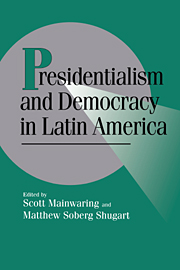Book contents
- Frontmatter
- Contents
- Contributors
- Acknowledgments
- Introduction
- 1 Presidentialism and Democracy in Latin America: Rethinking the Terms of the Debate
- 2 Multipartism, Robust Federalism, and Presidentialism in Brazil
- 3 The Unrealized Potential of Presidential Dominance in Colombia
- 4 Presidential Behavior in a System with Strong Parties: Venezuela, 1958–1995
- 5 Strong Candidates for a Limited Office: Presidentialism and Political Parties in Costa Rica
- 6 Political Sources of Presidencialismo in Mexico
- 7 Evaluating Argentina's Presidential Democracy: 1983–1995
- 8 In Defense of Presidentialism: The Case of Chile, 1932–1970
- 9 Executive–Legislative Relations in Post–Pinochet Chile: A Preliminary Assessment
- 10 Hybrid Presidentialism and Democratization: The Case of Bolivia
- 11 Conclusion: Presidentialism and the Party System
- Appendix: Outlines of Constitutional Powers in Latin America
- References
- Index
7 - Evaluating Argentina's Presidential Democracy: 1983–1995
Published online by Cambridge University Press: 05 June 2012
- Frontmatter
- Contents
- Contributors
- Acknowledgments
- Introduction
- 1 Presidentialism and Democracy in Latin America: Rethinking the Terms of the Debate
- 2 Multipartism, Robust Federalism, and Presidentialism in Brazil
- 3 The Unrealized Potential of Presidential Dominance in Colombia
- 4 Presidential Behavior in a System with Strong Parties: Venezuela, 1958–1995
- 5 Strong Candidates for a Limited Office: Presidentialism and Political Parties in Costa Rica
- 6 Political Sources of Presidencialismo in Mexico
- 7 Evaluating Argentina's Presidential Democracy: 1983–1995
- 8 In Defense of Presidentialism: The Case of Chile, 1932–1970
- 9 Executive–Legislative Relations in Post–Pinochet Chile: A Preliminary Assessment
- 10 Hybrid Presidentialism and Democratization: The Case of Bolivia
- 11 Conclusion: Presidentialism and the Party System
- Appendix: Outlines of Constitutional Powers in Latin America
- References
- Index
Summary
Despite the generally low esteem in which it is held by many academics (e.g., Linz and Valenzuela 1994), presidentialism remains quite popular throughout Latin America. Given the reality of a large number of presidential systems that show no prospects of switching to parliamentarism, what is needed is systematic analysis of arrangements and methods that can be utilized to increase the effectiveness and the probability of survival of democratic presidential government.
This chapter evaluates the functioning of the Argentine presidential system during its most recent and successful experience with democratic government, 1983–present. The chapter examines those institutional and partisan factors that have aided the success of the Argentine democratic system and those which have had an adverse impact on its functioning.
CONFRONTING CRISIS IN A PRESIDENTIAL SYSTEM
On December 10, 1983, President Raúl Alfonsin assumed office for a sixyear term, thereby officially ending slightly more than seven and a half years of military rule. During his administration Alfonsín faced two principal policy challenges: (1) promoting economic growth and stability and (2) normalizing relations with the military. While achieving some initial success in both areas, by the latter third of his term (1987–89) Alfonsín was confronted by growing economic difficulties (e.g., hyperinflation) and increasingly connective relations with the military (e.g., three serious military uprisings between April 1987 and December 1988). These problems contributed to electoral difficulties for Alfonsín's Unión Cívica Radical (UCR), which was soundly defeated by the principal opposition Partido Justicialista (PJ) in both the 1987 Chamber and gubernatorial elections and in the 1989 presidential and Chamber elections.
- Type
- Chapter
- Information
- Presidentialism and Democracy in Latin America , pp. 259 - 299Publisher: Cambridge University PressPrint publication year: 1997
- 90
- Cited by



